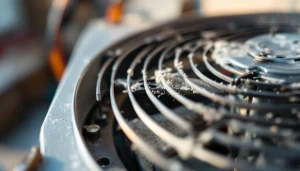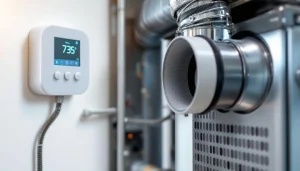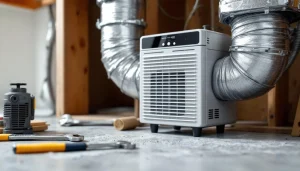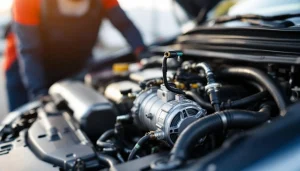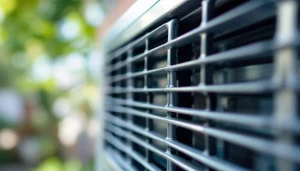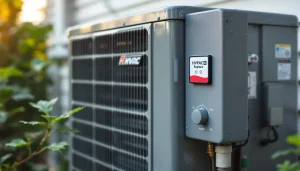Most efficient way to heat and cool a home is at the forefront of many homeowners’ minds. With increasing energy costs and a growing emphasis on sustainability, finding ways to effectively manage your home’s climate while minimizing energy use is crucial. Whether you’re considering innovative technologies like geothermal systems or more traditional options such as heat pumps, understanding your choices can significantly impact your household budget and comfort.
- Using a whole-house approach can save about 30% on your energy bill.
- Proper maintenance and upgrades help in boosting efficiency.
In Palm Coast, FL, the allure of year-round comfort is undeniable. However, the wrong HVAC choices can lead to higher utility bills and environmental strain. From ensuring the integrity of your home’s insulation to selecting a high-efficiency heating system, every choice contributes to the overall efficiency of your home heating and cooling.

Most Efficient Way to Heat and Cool a Home
When it comes to the most efficient way to heat and cool a home, heat pumps stand out as a top choice. These systems are designed to use less energy, which means lower utility bills and a smaller carbon footprint. Let’s explore the two main types of heat pumps: air-source and geothermal.
Air-Source Heat Pumps
Air-source heat pumps are a popular option, especially in moderate climates. They work by transferring heat between the inside of your home and the outside air.
-
Efficiency: These systems are known for their high efficiency. In fact, they can produce up to four times the energy they consume. This makes them an excellent choice for energy savings.
-
Moderate Climates: Air-source heat pumps perform best in areas where temperatures don’t drop too low. In Palm Coast, FL, for example, the mild winters make air-source heat pumps an ideal solution.
-
Ductless Systems: One of the benefits of air-source heat pumps is that they can be ductless. These systems are perfect for homes without existing ductwork or for those looking to add heating and cooling to specific areas.
Geothermal Heat Pumps
Geothermal heat pumps take efficiency to another level by utilizing the stable temperatures found underground.
-
High Efficiency: These systems are among the most efficient heating and cooling options available. They use ground loops to exchange heat, which allows them to maintain a consistent temperature in your home with minimal energy use.
-
Ground Loops: The installation of ground loops can be costly and complex, but the long-term savings and efficiency gains often justify the investment. Geothermal systems can reduce energy consumption by up to 70%.
-
Year-Round Comfort: Geothermal heat pumps not only provide efficient heating in winter but also effective cooling in summer, making them a versatile choice for year-round comfort.
In conclusion, whether you opt for air-source or geothermal, heat pumps offer significant energy savings and efficiency. They are a wise investment for those looking to reduce their environmental impact and lower their energy bills. Let’s explore other energy-efficient heating systems and how they can further improve your home’s comfort and efficiency.
Energy Efficient Heating Systems
Heating systems play a critical role in maintaining comfort during colder months. Among the most efficient options are furnaces and boilers, both of which are evaluated using AFUE ratings. AFUE, or Annual Fuel Utilization Efficiency, measures how effectively a system converts fuel into heat. Higher AFUE ratings mean more efficient systems, which translates to energy savings and reduced environmental impact.
Gas Furnaces
Gas furnaces are a popular choice for homeowners due to their cost-effectiveness and widespread availability. They use natural gas to produce heat, which is often cheaper than electricity. Newer models come equipped with variable-speed motors, which adjust the blower speed to match the heating demand, enhancing efficiency and comfort.
-
Natural Gas: This resource is abundant and typically less expensive, making gas furnaces a cost-effective option for many families. They are especially common in areas with existing gas lines.
-
Efficiency: Modern gas furnaces can achieve AFUE ratings of up to 98%, meaning only 2% of the energy is wasted. This is a significant improvement over older models, which often had ratings below 70%.
-
Variable-Speed Motors: These motors not only improve efficiency but also reduce noise and provide more consistent heating. They adjust the blower speed based on the temperature settings, ensuring optimal performance.
Electric Furnaces
Electric furnaces are another choice, known for their safety and ease of installation. They don’t rely on combustion, which eliminates the risk of carbon monoxide leaks.
-
Electricity: While generally more expensive than natural gas, electricity is available everywhere, making electric furnaces a viable option for homes without gas lines.
-
Safety: Since they don’t burn fuel, electric furnaces produce no exhaust gases, making them safer for indoor air quality. This can be particularly appealing for families with young children or elderly members.
-
Operational Costs: Despite their safety benefits, electric furnaces can be more costly to operate due to higher electricity prices. However, they can be paired with renewable energy sources, like solar panels, to offset costs and environmental impact.
In summary, both gas and electric furnaces offer unique advantages. Gas furnaces are generally more cost-effective with higher efficiency ratings, while electric furnaces provide safety and ease of use. Choosing the right system depends on your home’s infrastructure and energy priorities. We’ll dig into ways to improve HVAC efficiency through better insulation and smart technology.
Enhancing HVAC Efficiency
When it comes to making your home more energy-efficient, your HVAC system is just one piece of the puzzle. To truly maximize efficiency, you need to focus on sealing and airtightness and ductwork maintenance. Let’s explore how these elements can help you achieve the most efficient way to heat and cool a home.
Sealing and Airtightness
Think of your home as a giant balloon. If there are holes or leaks, air escapes, causing your heating and cooling systems to work harder. This is why sealing your home is crucial.
-
Caulking: Use caulking to seal gaps around doors, windows, and any other openings where air might escape. This simple step can prevent energy loss and keep your home comfortable.
-
Air Leaks: Identifying and sealing air leaks is essential. You can do this by checking for drafts near windows and doors. Weatherstripping is another effective method to block these leaks.
-
Energy Loss: Unsealed homes can lose up to 30% of their energy through leaks. By addressing this, you not only save money but also reduce your environmental footprint.

Ductwork Maintenance
Your ductwork is like the veins of your HVAC system, distributing air throughout your home. If they’re not well-maintained, you could be losing a lot of energy.
-
Leaks: Duct leaks can cause significant energy loss. Ensure that all duct sections are tightly connected and sealed with metal screws and mastic or metal-backed tape.
-
Insulation: Insulating your ducts helps prevent heat loss. This is especially important for ducts that run through unconditioned spaces like attics or basements.
-
Air Loss Prevention: Regular maintenance, including cleaning and inspecting ducts, ensures that air flows efficiently. Professional cleaning services can help remove dust and debris that may block airflow.
By focusing on sealing and maintaining your home’s ductwork, you can significantly improve your HVAC system’s efficiency. This not only leads to energy savings but also improves indoor air quality and comfort.
Incorporating smart thermostats can further optimize your home’s energy use. These devices allow you to control your heating and cooling systems more precisely, adapting to your schedule and preferences. We’ll look at how these technologies can transform your home’s energy efficiency.
Frequently Asked Questions about Efficient Heating and Cooling
What is the most energy efficient heating and cooling system?
When it comes to the most efficient way to heat and cool a home, heat pumps take the spotlight. These systems are incredibly efficient because they move heat rather than generate it. There are two main types: air-source and geothermal heat pumps.
Air-source heat pumps are ideal for moderate climates. They work by transferring heat between your house and the outside air. Even when it’s cold outside, they can extract heat from the air, making them a versatile choice for both heating and cooling.
Geothermal heat pumps go a step further by using the constant temperature of the ground. They are more efficient than air-source pumps but come with higher installation costs due to the need for ground loops. However, they offer significant energy savings over time.
How can I reduce my heating and cooling costs?
Reducing your heating and cooling costs involves a combination of smart strategies:
-
Thermostat Settings: Use a programmable or smart thermostat to optimize energy use. Set it to lower temperatures when you’re not home or during sleep hours. For heat pumps, it’s best to “set it and forget it” at a comfortable temperature.
-
Insulation: Proper insulation in your attic, walls, and floors prevents heat loss. This keeps your home warm in winter and cool in summer without overworking your HVAC system.
-
Maintenance: Regular maintenance of your heating and cooling systems is crucial. This includes cleaning filters, checking for leaks, and ensuring all components are in good working order. A well-maintained system runs more efficiently and lasts longer.
Do heat pumps work in cold weather climates?
Yes, heat pumps can work in cold weather climates, thanks to advancements like hyper-heating technology. Brands like Mitsubishi have developed systems that maintain efficiency even when temperatures drop significantly. These systems are designed to extract heat from the air efficiently, even in colder conditions.
While traditional air-source heat pumps may struggle in extreme cold, modern units with hyper-heating technology ensure reliable performance and comfort. This makes them a viable option for homeowners in colder regions looking to maintain energy efficiency throughout the year.
By understanding these systems and strategies, you can make informed decisions to optimize your home’s heating and cooling efficiency, saving both energy and money.
Conclusion
At Klein Cooling, we understand that choosing the most efficient way to heat and cool a home is crucial for comfort and cost savings. As a family-owned business in Palm Coast, FL, we pride ourselves on delivering expert HVAC services custom to your needs.
Our commitment to honesty, integrity, and exceptional service ensures that every installation, repair, or maintenance job is done right. We offer a range of services, from heat pumps to ductless systems, that prioritize energy efficiency and environmental friendliness. Whether you’re considering an air-source heat pump for its versatility in moderate climates or a geothermal heat pump for long-term energy savings, we have the expertise to guide you.
Additionally, our team is dedicated to enhancing your HVAC system’s efficiency through regular maintenance and smart solutions. We offer first responder, military, and senior discounts, reflecting our commitment to serving our community with respect and care.
For more information on how we can help you achieve optimal heating and cooling efficiency, visit our Additional Services page. Let us assist you in creating a comfortable and efficient home environment.
By choosing Klein Cooling, you’re not just investing in your home’s comfort—you’re also partnering with a company that values family-friendly service and professional expertise. Trust us to keep your home comfortable all year round.

